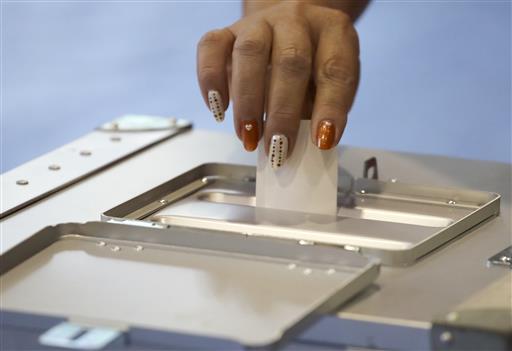
A voter casts her ballot in Japan’s upper house parliamentary election at a polling station in Tokyo, Sunday, July 10, 2016. While Prime Minister Shinzo Abe’s ruling party is seeking a mandate for his leadership by emphasizing his economic revitalization policies in the Sunday’s election, several opposition parties are coordinating a negative campaign, cautioning voters that a landslide for Abe would give him an upper hand to revise the pacifist post-World War II constitution. AP Photo/Eugene Hoshiko
TOKYO — Japan’s ruling coalition was a clear winner in Sunday’s parliamentary election, Japanese media exit polls indicated, paving the way for Prime Minister Shinzo Abe to push ahead with his economic revival policies, but also possibly changing the nation’s postwar pacifist constitution.
Several major TV news shows and the Kyodo News agency cited their exit polls and reported almost as soon as voting ended that the ruling coalition, headed by Abe’s Liberal Democratic Party, had kept its majority and increased its number of seats. The opposition lost many of its seats, they said.
Half of the seats of parliament’s less powerful upper house were up for grabs. There had been no possibility for a change of power because the ruling coalition already controls the more powerful lower house, but the balloting was a key gauge for how much support Abe’s coalition has among the public. The opposition had called on voters to show their rejection of Abe’s position to have a more assertive military role for Japan.
“That is so dangerous, and it may lead Japan into war with other nations and make it a nation without freedoms at home,” Yuriko Keino, a musician and composer living in Tokyo, said Sunday. “We must all raise our voices and come together to protect peace and freedom.”
With their pro-business policies, the Liberal Democrats have ruled Japan almost continuously since World War II, and until recently enjoyed solid support from rural areas. The few years the opposition held power coincided with the 2011 earthquake, tsunami and nuclear disasters that devastated northeastern Japan. The opposition, however, fell out of favor after being heavily criticized over its reconstruction efforts.
Some Japanese agree with Abe’s views on security because of growing fears about terrorism, the recent missile launches by North Korea and China’s military assertiveness.
Some analysts see 78 as a magic number — the number of seats that would give the ruling coalition a two-thirds majority in the upper house. That kind of support could be enough for Abe to push forward with rewriting Japan’s postwar pacifist constitution. But a referendum would still be needed, and public support for pacifism remains high. Final results of the balloting aren’t expected until early Monday.
Sunday’s was the first major election after the voting age was lowered from 20 to 18, potentially adding 2.4 million voters. Although “manga” animation and other events were used to woo young voters, results from early and absentee voting pointed to a low turnout. Many young people are disillusioned with mainstream politics.
Masses of people have come out against nuclear power since the March 2011 catastrophe. But that has not weakened Abe in recent elections, although he has made clear he is eager to restart reactors that were idled after the disaster, the worst since Chernobyl, and make nuclear power a Japan export.
Abe had repeatedly stressed during his campaign that his “Abenomics” program to bolster growth is still unfinished, and that patience is needed for results.
“I voted hoping the economy of the country gets better. I think the economy is still hitting bottom, and I hope it gets better even just a bit so that my life gets easier,” Jiro Yonehara, a “salaryman,” as company employees are called, said after emerging from a voting booth.